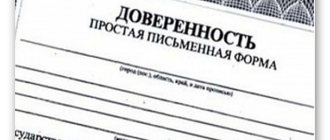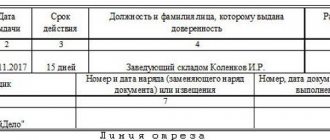What is a power of attorney for the right to sign documents, and what types exist?
Each director of an institution has the most important power - legal power.
This means that only he has the right to carry out all legal procedures for the enterprise until he issues a so-called power of attorney with the right to sign for his subordinate. A document of trust with the right to sign documents is a form that authorizes the attorney to carry out all legal actions in various institutions, while being a representative of the interests of his company. It must be taken into account that the trustee is vested only with those rights that will be written directly on the trust form.
This means that this type of trust document is divided into three types:
- One-time . This type of trust is issued to an authorized person only for signing documents in a single case, that is, one-time use.
- Special . This type is made up for a subordinate in the case when it is necessary to perform a transaction on papers only in a certain place, that is, on behalf of the head of the company.
- General . A trust of this type gives the attorney, roughly speaking, all the powers of an official representative of the institution. With the help of a general trust, he has the right to endorse documents and carry out orders of a various nature for the company for several years.
( Video : “How to transfer the right to sign primary documents”)
Who and to whom can issue a power of attorney for the right to sign
Any institution implements certain procedures, for which there is a package of so-called supporting documentation. All acts contained in this package refer to primary documents. Those employees who have specific competencies directly to do so have the right to sign such documents. Typically, the list of such rights depends on the position of the employee of the institution. However, it is possible to grant such powers to other employees using a special document of trust with the right to sign certain materials. For example, according to the rules, all primary documents must be signed directly by the general director of the company.
The formation of a document of a trust nature with the right to sign is provided for both individuals and the head of the institution. At the same time, it is issued to an employee of the company or a private person. There are two parties to this agreement:
- A witness is a person who gives away his rights;
- An attorney is a person who receives certain competencies from the management of an institution.
Typically, legal entities issue this trust deed to their subordinate institutions. These include: lawyers, accountants, department administrators, and so on. Consequently, a power of attorney can be issued to any employee, regardless of his position, but the period of validity of such a trust will be limited.
Who issues a power of attorney and in what cases?
The general director of the company has the right of first signature. The manager acts based on the provisions of the charter. There is no additional need to formalize his powers (Article 40 of Law 14-FZ of 02/08/98). This point of view was confirmed by the Supreme Court of Russia in Resolution No. 25 of June 25, 2015. Since the constituent document does not indicate the personal data of the top manager, confirmation of the status is an extract from the Unified State Register of Legal Entities.
The charter of a business company may provide for an alternative mechanism. The founders grant the right to sign documents and act on behalf of the company without additional identification to several top managers. In this case, information about each manager is entered into the state register. The principle of plurality of directors is enshrined in Article 53 of the Civil Code of the Russian Federation.
Important clarifications regarding the right of first signature were given by the Central Bank of Russia in instruction No. 28-I dated September 14, 2006. The regulator indicated who else in the company has the authority to certify documents. The chief accountant of the company was recognized as such an official. Subsequently, the instructions became invalid due to the publication of rules No. 153-I. However, the approach has not changed.
The absence of references to other employees in regulations does not limit society in choosing a representative. The issuance of a power of attorney may be carried out at the discretion of the director. The right to sign business documents may be given to any legally capable person. The absence of requirements for experience, employment, or education allows you to delegate functions to almost anyone. In practice, these include HR inspectors, lawyers, cashiers, warehouse managers, and secretaries.
Note! Article 185 of the Civil Code of the Russian Federation mentions the assignment of status to a “person”. The legislator does not make any clarifications. Authorization can be obtained by both individuals and legal entities.
Main features of a power of attorney for the right to sign
We have already said earlier that a document of trust with the right to sign is divided into three types, each of which implies certain actions, these are: general (the entire package of powers); special (designed to carry out instructions from the manager in certain places) and one-time (used once to carry out a legal procedure over a document).
It should be noted that if the power of attorney is drawn up purely for the signing of special documents, they must be clearly stated in the text. It is recommended that you list this documentation on separate lines.
Once the trust document is already in hand, the attorney has the right to dispose of it in various institutions - government or commercial.
I would also like to add to the features of such a power of attorney that there are no legal norms for filling out the text, but it is required to comply with the rules of the civil code. All personal information about both parties, their signatures must be present here and, above all, the validity period of the document itself must be indicated.
A trust of this type does not require certification by a notary - this is most likely the main feature of this document. To confirm his legal capacity, just the director’s signature and the institution’s seal itself are enough. However, there are still cases when such a trust document must be certified by a notary. According to federal law, when signing documents in government agencies or in court, a power of attorney of this type must undergo a certification procedure by a notary service. This is done so that the trust document contains a special mark, which confirms its authenticity.
General rules for drawing up a power of attorney
In order for the power of attorney to be accepted by the recipient structures, when issuing it, it is enough to follow the following rules:
- It is compiled on paper; an electronic version is not provided for by the provisions of the Civil Code of the Russian Federation. It is not necessary to use letterhead; for many recipients (for example, banks, counterparty companies) it is enough to print the text on a blank sheet of paper.
- The document clearly states the powers delegated to the chief accountant. Vague phrases and formulations such as “and so on” should be avoided.
- The power of attorney is certified by a “living” signature (facsimile and digital signature will not work) of the first person of the company or his deputy, who has the right to delegate the assigned powers. The organization's seal must be affixed.
- The text must include complete information about the company whose interests the employee will represent: its name, tax identification number, registration address.
- The document indicates the date of issue. According to the norms of the Civil Code of the Russian Federation, a power of attorney that is not dated is considered legally void.
- The document specifies the validity period (in numbers and in words). It can be entered in two formats: “valid until nn.nn.nnnn” or “valid for two years from the date of issue.” The maximum period is 3 years. If the “expiration” period is not indicated, then the power of attorney in accordance with Art. 186 of the Civil Code of the Russian Federation gives the person specified in it authority for a year.
Sample
According to the current rules, most often a power of attorney for the chief accountant does not require certification by a notary. A form signed by the director is sufficient for documents prepared for receiving inventory items from counterparties, for transferring papers or cash to banks, submitting reports to the tax office, etc.
You cannot do without notarization in two cases:
- The first is if the transaction, which the chief accountant is authorized to complete, will be registered with a notary (for example, the purchase and sale of a business or a share in it).
- The second is if the services of a notary are required in accordance with legal regulations (for example, when registering ownership rights to real estate).
How to write
Next, we should examine topics related to the design of the text of the trust for the right to sign documents. As we have already clarified earlier, the text of the trust document is not regulated by law. Usually it is compiled in free form, while observing some mandatory clauses that will be used directly in the text of the trust itself. Such items are personal details about the witness and the trustee, a number of competencies providing and the period of validity of the trust form. For the power of attorney to come into force, it is necessary to affix the signatures of both parties.
When writing the trust text, it is important to ensure that the competencies being transferred are precisely defined. Moreover, if there are quite a lot of such powers, then information about them should be as clear and concise as possible.
( Video : “All working hours for signing documents? How to sign documents.”)
In what cases is a power of attorney required to formalize a primary document?
Heads of companies, especially large ones, are very busy people. And, as a rule, they do not have time to sign all the documents drawn up at the enterprise. Such powers are usually transferred to the deputy, chief accountant or heads of departments. In order for the documents signed by these employees to have legal force, it is necessary to draw up a power of attorney for the right to sign the primary documents.
Its form is not approved by law, therefore, when drawing up, you should be guided by the general requirements of the law (in particular, Article 185 of the Civil Code of the Russian Federation).
How to issue a power of attorney for the right to sign documents in 2021?
Drawing up a trust document is a time-consuming procedure, since it is necessary to be vigilant in writing the text so as not to miss important aspects. Typically, filling out such a document is entrusted to secretaries, lawyers or chief accountants of an institution who have experience in writing this type of documentation. In the case where the power of attorney is filled out independently, the text of the trust must include all important information that you need to be familiar with in advance. The following data is included here:
- name and registration number of the letter of trust (“Power of Attorney”);
- date and place of drawing up the trust document;
- passport details of the witness. Due to the fact that it is a legal entity, certain information is required:
- name of company;
- registration state number;
- registration reason code;
- taxpayer identification number;
- business location address.
When a power of attorney is issued on behalf of a specific employee holding a position, the following data must be entered here:
- Last name, first name, patronymic, passport details, place of registration;
- personal information of the attorney, with the help of which he will confirm his identity to third parties;
- a list of documents to be signed that the attorney will be able to carry out in the future;
- validity period of the trust document;
- specified parameter with permission or prohibition of the right of subrogation;
- The final note in drawing up a trust is the signature of the witness and the seal of the institution.
Instructions for filling
In order to avoid mistakes in writing a trust document, we will provide you with instructions for filling out a trust sheet with further rights to sign. Usually, the instructions can help those people who fill it out in any form, that is, from start to finish with their own hands.
- First, at the top of the paper you need to write a word that will mean the name of the document - “Power of Attorney”. Here, if necessary, enter the document number assigned to it according to internal document flow. Below these entries, you must indicate the date of filling out the trust paper and the locality where it is being done.
- The next step is to indicate all the important data of the certifier (legal entity), namely: the full name of the company, its abbreviation, banking information, address, both actual and legal. It is also worth including the registration state number, identification number and registration code. Please enter the full name of the principal here. Typically this includes directors, deputies and other persons authorized to issue such documents. And you also need to refer to the protocol on the basis of which this person acts (this is usually reflected using the following words: “based on ...” charter, power of attorney or regulations).
- In the next line, the text of the trust must contain all the exact information of the powers transferred from the witness to the attorney, that is, a list of documents that he can sign at business meetings, and so on.
- At the end of the text of the trust document, its validity period should be indicated. It is worth considering that if such a period is not specified, the trust will last for one year. Also in the same line it is necessary to put a mark prohibiting the transfer of this power of attorney to third parties, that is, without the right of subrogation.
- The result of drawing up this paper is the signatures of both parties.
Power of attorney for the right to sign documents for the director
Power of attorney for the right to sign primary documents
Power of attorney for the right to sign documents of an individual
Power of attorney for the right to sign documents as an individual entrepreneur
Who has the right to sign a power of attorney and when does it need to be executed?
When drawing up a document for concluding transactions on behalf of an LLC or a company that has chosen a different form of ownership, you need to be attentive to the details and thoroughly work through it. There are also certain requirements for signatures.
Video
The head of the company and the person to whom the powers are transferred must sign the completed power of attorney. Additionally, a stamp must be affixed and the registration number of the paper must be reflected. A power of attorney is necessary so that a third party can enter into a transaction on behalf of the director, who for one reason or another cannot be present during the procedure. So, the paper can be issued in the name of his deputy.
Transfer of signature rights is necessary in the following situations:
- documents are drawn up, which must necessarily bear the signature of the manager;
- reporting is provided to government bodies;
- you need to sign contracts that for some reason must be reviewed immediately;
- it is necessary to approve the commercial proposal put forward to the company;
- required to sign documentation related to workers' compensation.
Typically, powers of attorney are issued to lawyers, heads of departments, accountants and other senior officials, taking into account their powers. The paperwork is completed by the organization's clerk or lawyer. The signature is affixed by the head of the company.
Video
Duration of power of attorney
Each trust form has a limiting period of legal capacity. It is customary to indicate the validity period of the trust certificate at the end of the trust text. The maximum period of legal capacity is three years. If this period is exceeded, the trust automatically becomes ineffective. In some cases, this period is not reflected in the text, therefore, according to the civil code of the Russian Federation, the trust document will retain its legal force for one year.
However, in addition to the expiration of the period specified directly in the document itself, the trust document may interrupt its properties for other reasons. These include:
- early revocation of the power of attorney by the witness;
- refusal of the attorney to act on this document;
- death of the principal, his incapacity or limited legal capacity, or is considered missing;
- death of the attorney, his incapacity or limited legal capacity, or is considered missing.









